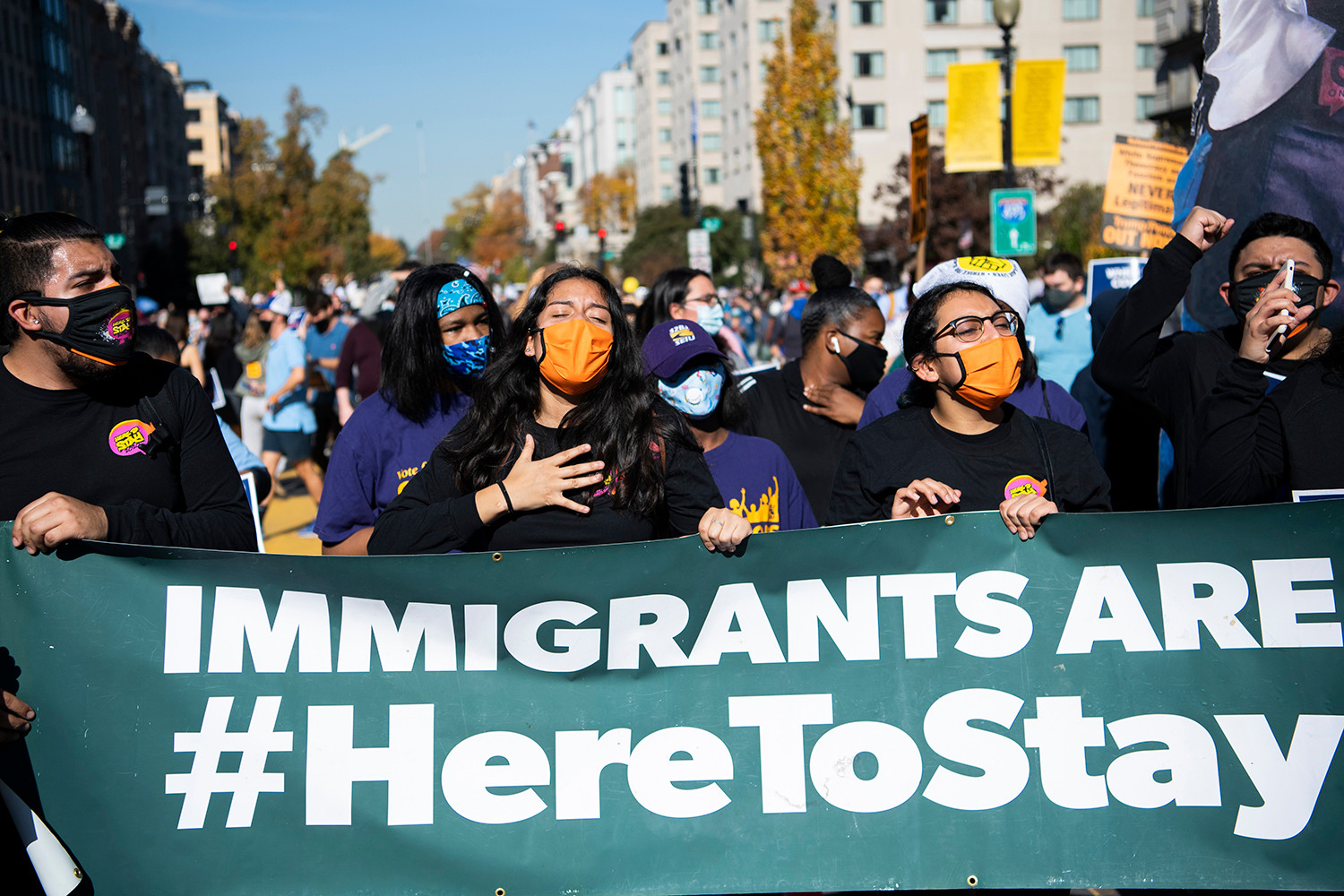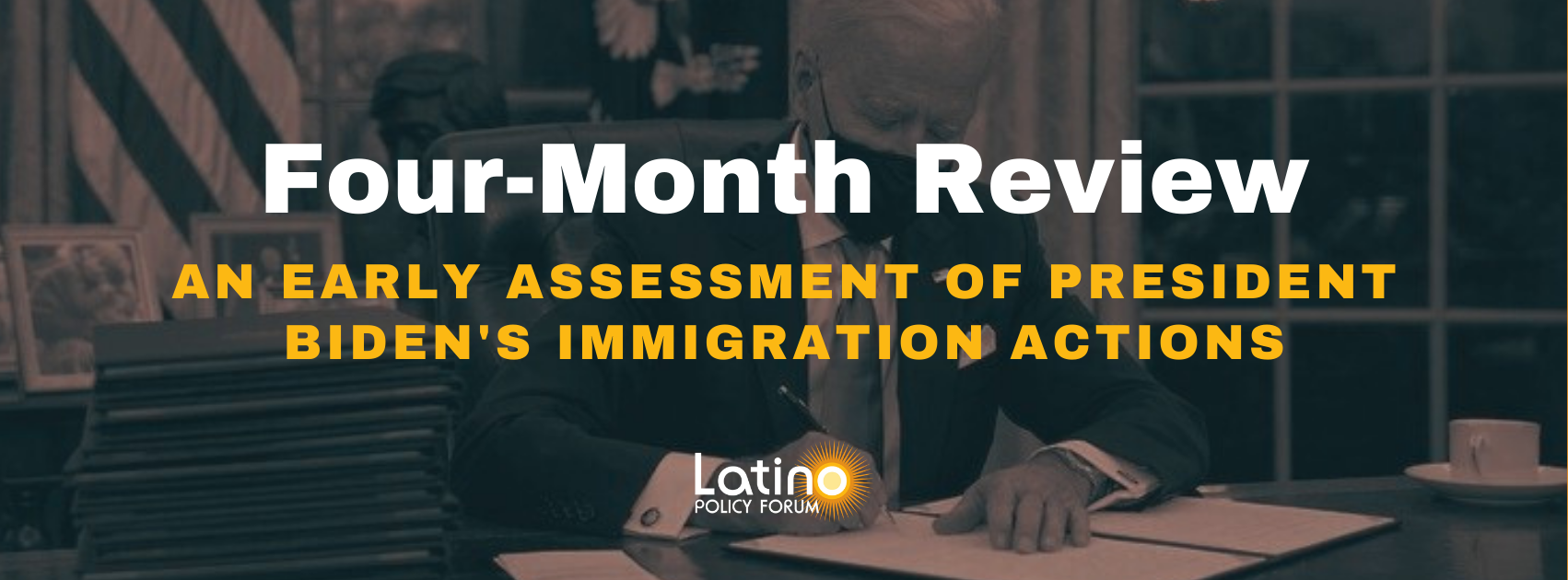Four-Month Review: An Early Assessment of President Biden’s Immigration Actions
A thorough look back on the new administration's accomplishments and shortcomings in immigration policy and recommendations for moving forward
By Sarah Cartagena, Immigration Analyst; Louisa Silverman, Immigration & Housing Analyst Intern; & Sofia Gomez, Housing Policy Intern
Para leer en español, haga clic aquí.



On the campaign trail, President Joe Biden made many promises to the immigrant community, including pledges to swiftly undo the harm caused by the policies and executive actions of the previous administration and to improve the immigration system. In just under four months in office, he has fulfilled a considerable number of these promises, but he still has a long way to go to uphold significant commitments.
Here, we examine the progress and current shortfalls of the Biden Administration’s immigration action. We have divided this blog into four brief sections: Immigration Promises Kept, Actions Beyond Promises, Shortcomings, and Recommendations for Moving Forward.
Immigration Promises Kept
In his first few months, President Biden has initiated numerous reforms in line with his clear-cut immigration campaign promises. The most notable of these include suspending wall construction along the southern border, revoking the ban on individuals from Muslim-majority countries entering the US, permanently blocking the Trump-era public charge rule, reversing the “zero tolerance” policy that forcibly separated thousands of children from their families at the US-Mexico border, and assembling a task force to reunite separated families (to date, however, only four families have been reunited since the task force was created on February 2, 2021). President Biden also ended the Migration Protection Protocols (MPP), commonly known as the ‘Remain in Mexico’ policy, which forced asylum-seekers to wait in Mexico for their asylum court hearings. He has since started to slowly allow those waiting under the program into the United States.
President Biden also returned several policies to their previous, Obama-era iterations. He recommitted to the Deferred Action for Childhood Arrivals program (DACA) after former President Trump attempted and failed to end the program that shields the nearly 700,000 individuals currently enrolled from being deported. His administration revised the deportation criteria to include only those who pose a national security, border security, or public safety risk. This has shown to have reduced the number of deportations so much that deportation figures in April 2021 were the lowest to date, and the number of ICE arrests have fallen to less than half of those during the Trump administration. These figures, of course, exclude the continued expulsions at the southern border under Title 42.
President Biden has also kept his promise of creating legislation providing a pathway to citizenship with his US Citizenship Act of 2021. Introduced to Congress on February 18, 2021, this comprehensive immigration bill includes an eight-year path to citizenship, reduces barriers to work authorization, and increases worker protections, among other provisions. However, this legislation has not yet been approved by Congress, and President Biden has since shifted his focus to passing smaller bills that focus on Dreamers and others with temporary protections from deportation.
In line with President Biden’s promise to review Temporary Protected Status (TPS) for immigrant populations facing return to unsafe countries, he designated TPS for Venezuelan and Burmese nationals and extended it for Syrians as well.
President Biden has also entrusted Vice President Kamala Harris with working alongside Central American leaders to bolster the region’s economy and address the root causes of violence and poverty in these countries as a means to stemming immigration. However, the process is expected to be slow-moving.
Actions Beyond Promises
Along with maintaining several key immigration promises, President Biden used executive action to further implement changes that were not necessarily at the center of his immigration campaign. Departments under the Biden Administration have halted numerous proposed rules that would have had deleterious effects on immigrant communities. The Department of Housing and Urban Development (HUD) withdrew a proposed rule that would have negatively impacted families of mixed immigration status. The Department of Homeland Security (DHS) withdrew a proposal that would have expanded its authority to collect biometrics for every applicant, sponsor, petitioner, or beneficiary. The United States Citizenship and Immigration Services (USCIS) reverted back to the 2008 civics test for the naturalization process from the test put in place in December 2020 that had stricter requirements for passing. The department also halted a rule that would have increased fees for applications, including a $50 fee for asylum applications.
In addition, DHS instituted guidance to limit immigration enforcement at or near courthouses and at vaccination sites. The Biden Administration also ordered immigration enforcement agencies and USCIS to replace the terms “illegal alien” and “assimilation” with “undocumented noncitizen” and “integration,” respectively, marking a meaningful shift in rhetoric for the new administration.

Photo: Tom Williams, Getty Images
Shortcomings
Although President Biden has taken remarkable steps in the right direction, there are still areas for significant improvement, as well as several campaign promises that have yet to be fulfilled.
During his first days in office, President Biden ordered a 100-day deportation moratorium in order to allow time for a review of ICE policies and practices. This was a key promise from his campaign trail. It was subsequently blocked indefinitely by a federal judge in Texas, and the Biden Administration has continued to conduct deportations.
Similar to tactics used during the Trump administration, the Biden Administration signed agreements with Mexico, Honduras, and Guatemala to increase troops at their borders in an effort to stem migration to the United States.
Another concern is President Biden’s continued use of Title 42, a US health law provision invoked during the Trump Administration, which allows customs officers to prohibit US entry to individuals who the CDC believes pose a serious danger of introducing an infectious disease. This provision has been used to prohibit asylum-seekers from entering the United States. President Biden has continued to deny entry to asylum-seekers on these grounds, with the exceptions of unaccompanied children and few families. According to United We Dream, since President Biden’s inauguration, Title 42 has been invoked over 300,000 times to block individuals from entering the United States.
During President Biden’s first months, there has been a large increase of unaccompanied minors apprehended by border patrol officials. This is partially due to changes in the Title 42 policy, which allowed for the entry of unaccompanied children and which may be causing some parents (who are not being allowed into the US under the same policy) to send their children alone across the border. Their reasoning is that it is safer for the children than the present dangers that they face at home. Due to this influx, children are staying longer than the 72-hour maximum regulation in Customs and Border Patrol (CBP) custody, some in abhorrent and overcrowded conditions.
Additionally, President Biden failed to maintain his campaign promise of raising the refugee cap for this fiscal year to 125,000 refugees. After initially announcing that he would set the refugee cap at 62,500, Biden retracted and announced that he would keep the 15,000 cap set in place by the Trump administration for this fiscal year. After facing pushback, President Biden reaffirmed his commitment to 62,500 refugees for this fiscal year, though he added that it would be a difficult target to achieve this late in the year.
Recommendations for Moving Forward
The Biden administration has been rightly applauded for promoting many immigration reforms and for advancing legislation to provide a pathway to citizenship for all undocumented individuals, but the work to overcome the current hurdles for a more just immigration system has just started.
Moving forward, the Forum recommends that the Biden administration increase access to legal representation for detained immigrants, which can help ensure that families have a higher chance of staying together, as noncitizens are 10.5 times more likely to have a successful outcome in immigration proceedings with legal representation.
We also support either revoking or fundamentally revising Title 42, a policy that excessively expels asylum-seekers from the border, denies their right to seek asylum, and has caused countless families to face dangerous conditions in Mexico and elsewhere. In addition, we recommend withdrawing troops from the borders of Mexico, Guatemala, and Honduras, and instead providing more resources for retooling the asylum system.
Lastly, as United We Dream has stated, the Biden administration should seek to stop deportations through prosecutorial discretion, which gives enforcement agencies the authority to not prosecute or enforce deportations.

